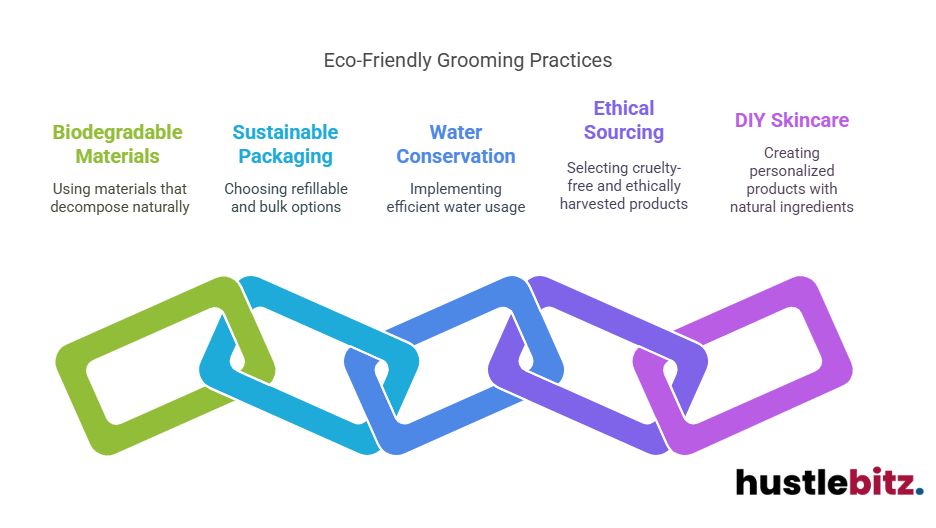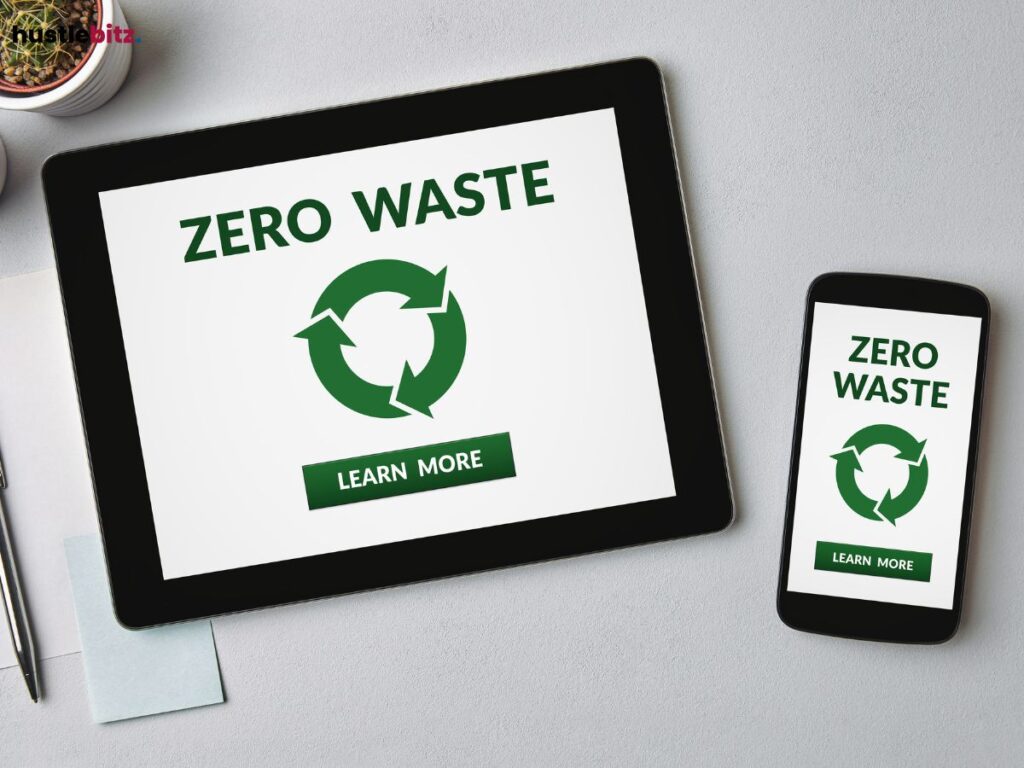Incorporating eco-friendly self-care practices into your daily routine not only enhances personal well-being but also supports environmental sustainability. Opt for products with sustainable packaging and ethical sourcing, and use plant-based and biodegradable ingredients to minimize ecological impact. Crafting DIY skincare solutions with natural exfoliants and essential oils ensures personalized, environmentally responsible care. Adopting water conservation practices like mindful showering and using efficient appliances further benefits the planet. Eco-friendly grooming accessories and sustainable haircare products contribute to a holistic green beauty regimen. By embracing these practices, you not only improve personal health but also make a positive environmental impact. Explore further to discover how these habits can transform your routine.
Key Takeaways
- Use biodegradable materials and organic oils in grooming routines to minimize environmental impact and nourish skin naturally.
- Opt for sustainable packaging, such as refillable containers and bulk store products, to reduce single-use plastic waste.
- Implement mindful showering practices and water-efficient appliances to conserve water and energy.
- Choose cruelty-free and ethically sourced products to support humane practices and sustainable harvesting.
- Craft personalized skincare products using natural ingredients and upcycled containers for an eco-friendly touch.

Choose Sustainable Products

When it comes to sustainable self-care, selecting eco-friendly products is a crucial step. By choosing items that prioritize sustainable packaging, you significantly reduce environmental impact. This means seeking out products packaged in materials that are either biodegradable or recyclable, thus minimizing waste.
Equally vital is the ethical sourcing of ingredients. Products that ensure ethical sourcing often support fair labor practices and sustainable harvesting methods, which are essential for maintaining ecological balance and supporting communities. Opting for items that clearly state their sourcing practices can make a substantial difference.
In addition, plant-based ingredients are a cornerstone of eco-friendly self-care products. These ingredients not only reduce the demand for synthetic chemicals but also often come from renewable resources. Plant-based formulations typically have a smaller carbon footprint and are less likely to cause environmental harm during production and disposal.
Moreover, the use of biodegradable materials in product composition ensures that, once discarded, these items break down naturally without leaving harmful residues. This consideration is critical in reducing long-term environmental degradation.
Lastly, cruelty-free options should be a top priority. These products are developed without animal testing, aligning with ethical standards that respect animal welfare. By choosing cruelty-free options, consumers can support companies that uphold humane practices.
DIY Natural Skincare
Crafting your own skincare products at home not only allows for personalization but also ensures the use of natural and eco-friendly ingredients. This practice supports sustainability by reducing reliance on commercial products that often contain synthetic chemicals and excessive packaging.
By utilizing herbal infusions, one can harness the therapeutic properties of plants like chamomile, calendula, and lavender, creating customized treatments tailored to specific skin types.
Natural exfoliants such as sugar, oatmeal, and ground coffee are excellent choices for creating gentle, yet effective, scrubs. These ingredients are biodegradable and often readily available in most households. For instance, a simple scrub combining sugar and olive oil can revitalize the skin without contributing to environmental degradation.
Incorporating essential oils into DIY skincare routines adds a luxurious touch while offering various benefits. Essential oils such as tea tree, lavender, and rosehip can address different skin concerns. However, it is crucial to understand the compatibility of these oils with your skin type to avoid adverse reactions.
Utilizing upcycled containers for storing homemade skincare products is another sustainable practice. Repurposing jars and bottles not only reduces waste but also adds a personal and eco-friendly touch to your skincare regimen.
Ensure that these containers are thoroughly cleaned and sterilized before use to maintain the integrity of the products.
DIY natural skincare fosters a deeper connection with the ingredients and processes involved, promoting both personal well-being and environmental stewardship. This hands-on approach provides a fulfilling way to care for your skin while embracing sustainable living.
Reduce Water Waste
Fostering a sustainable self-care routine extends beyond the ingredients used in skincare products; it also encompasses conscious efforts to minimize water waste. One proactive measure is rainwater harvesting, which captures and stores rainwater for various uses, such as gardening and flushing toilets. This practice not only conserves municipal water but also reduces the strain on local water resources.
Efficient irrigation systems, such as drip irrigation, further contribute to water conservation. These systems deliver water directly to the plant roots, minimizing evaporation and runoff.
Combining efficient irrigation with drought resistant landscaping, which involves choosing plants that require minimal water, can significantly reduce water usage in gardens and outdoor spaces.
Inside the home, mindful showering can make a substantial difference. By limiting shower time and turning off the water while lathering or shaving, individuals can substantially cut down on water consumption.
Additionally, investing in water efficient appliances, such as low-flow showerheads and dual-flush toilets, can lead to significant savings over time. These devices are designed to perform effectively while using less water, thus supporting a sustainable lifestyle.
Incorporating these practices into daily routines not only conserves water but also instills a greater sense of environmental responsibility. By adopting rainwater harvesting, efficient irrigation, mindful showering, water efficient appliances, and drought resistant landscaping, individuals can play a pivotal role in reducing water waste.
Ultimately, these steps contribute to a more sustainable and eco-friendly self-care routine, promoting both personal well-being and environmental stewardship.
Eco-Friendly Bathing

Incorporating eco-friendly bathing practices into your self-care routine is a crucial step toward promoting sustainability. By making conscious choices, you can indulge in a relaxing bath while minimizing environmental impact.
One way to enhance your bathing experience is through herbal baths. Utilizing herbs like lavender, chamomile, and rosemary not only provides calming scents but also eliminates the need for synthetic fragrances that can harm the environment.
Organic oils are another excellent addition to your bathing ritual. These oils, derived from natural sources, nourish your skin without the adverse effects of chemicals found in conventional products. For instance, adding a few drops of organic jojoba or coconut oil to your bathwater can offer moisture and relaxation, contributing to your overall wellbeing.
Mindful rituals play a significant role in eco-friendly bathing. Consider the duration of your baths; shorter baths save water and energy. Additionally, practicing mindfulness during your bath can enhance relaxation and reduce the desire for excessive consumption of bath products. Focus on the present moment, the warmth of the water, and the soothing scents around you.
Incorporating eco-friendly accessories can further reduce your environmental footprint. Bamboo bath brushes, natural sponges, and reusable cotton washcloths are excellent alternatives to plastic-based products.
These accessories not only reduce waste but also provide a more luxurious and sustainable bathing experience.
Green Beauty Routines

Expanding your self-care routine beyond bathing, embracing green beauty practices provides an opportunity to further align your daily habits with sustainable values. This approach not only enhances personal wellbeing but also contributes positively to the environment. By choosing products with plant based ingredients, you ensure that your beauty regimen is both gentle on your skin and on the planet. These ingredients are typically sourced from nature, offering a wealth of benefits without harmful chemicals.
Ethical sourcing is crucial in the realm of green beauty. This ensures that the raw materials used in your cosmetics are harvested in a manner that respects both the environment and the communities involved in their production. Supporting brands that prioritize ethical sourcing not only enhances your beauty routine but also promotes fair labor practices and ecological sustainability.
Consumers are increasingly aware of the importance of cruelty free cosmetics. By opting for products that are not tested on animals, you contribute to a more humane world while still enjoying high-quality beauty solutions. Many brands now proudly display certifications that confirm their commitment to cruelty-free practices.
Consider these sustainable beauty tips:
- Minimalist beauty: Simplify your routine by choosing multi-use products, reducing waste and consumption.
- Packaging alternatives: Select products with recyclable or biodegradable packaging to minimize environmental impact.
- DIY beauty: Create your own beauty treatments at home using simple, natural ingredients.
Incorporating green beauty routines into your self-care practice is a meaningful way to nurture yourself while supporting a healthier planet. This mindful approach to beauty not only benefits personal health but also underscores a commitment to sustainability and ethical responsibility.
Zero-Waste Grooming

Transitioning to zero-waste grooming practices is a powerful step towards reducing your environmental footprint while maintaining personal hygiene and care. By adopting strategies that emphasize sustainability, you can significantly diminish the waste generated from your daily grooming routine.
One of the most effective measures is the use of refillable containers. These containers can be filled with products from bulk stores, reducing the need for single-use plastics. When selecting grooming products, opt for those packaged in glass or metal, as these materials are more sustainable and often recyclable.
Incorporating biodegradable tools into your grooming toolkit is another impactful change. Items such as bamboo toothbrushes, wooden combs, and natural fiber bath sponges decompose more readily than their plastic counterparts, lessening their environmental impact.
These tools often come from ethical brands committed to sustainability, ensuring that your grooming practices align with broader ecological values.
Embracing minimalistic grooming involves simplifying your routine to include only essential products. This practice reduces waste and encourages mindful consumption. By carefully selecting multipurpose products, you can streamline your regimen while still achieving excellent results.
Natural haircare is a crucial component of zero-waste grooming. Shampoos and conditioners that use organic ingredients and come in solid bars or refillable containers not only minimize plastic waste but also reduce the number of harmful chemicals entering the environment.
Brands that prioritize ethical sourcing and production practices make it easier for consumers to make environmentally conscious choices.
Final Thoughts
Incorporating eco-friendly self-care practices into your daily routine is a fulfilling way to enhance personal well-being while also caring for our planet. By prioritizing sustainable products, DIY skincare solutions, and mindful habits, you not only nourish your body but also contribute to environmental conservation. Simple changes—like choosing biodegradable materials, reducing water waste, and adopting zero-waste grooming strategies—can significantly lower your ecological footprint. Embracing these practices fosters a deeper connection with both yourself and the world around you, creating a positive impact on your health and the environment. Start small, and let these sustainable habits transform your self-care routine into a holistic approach that nurtures you and the Earth alike.




